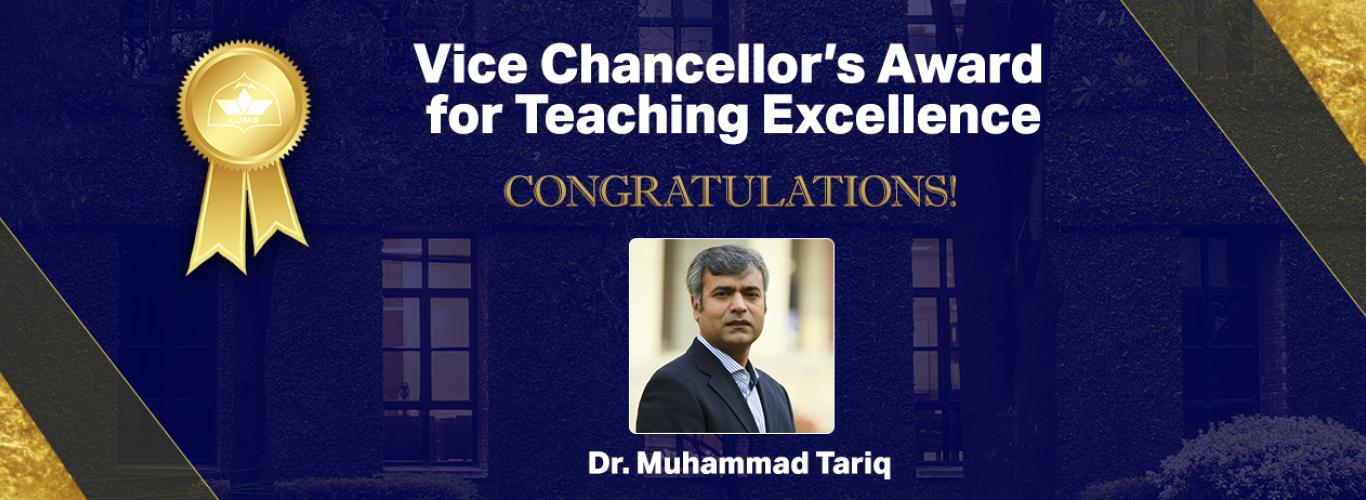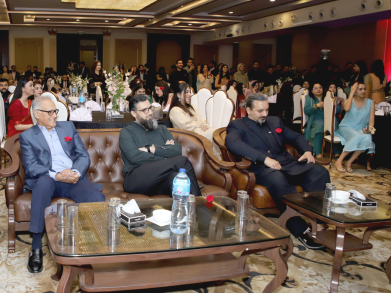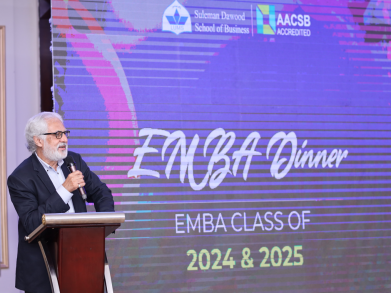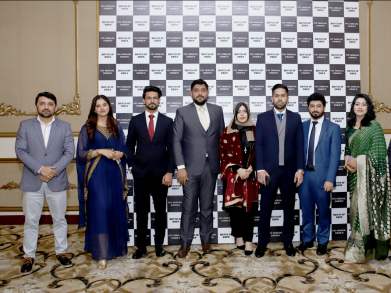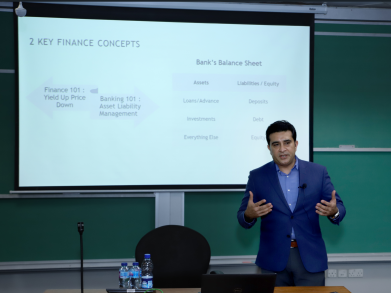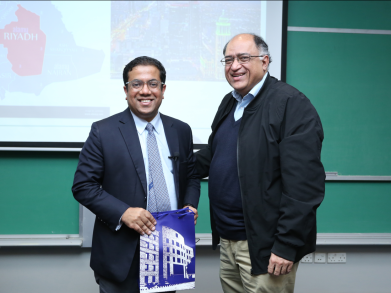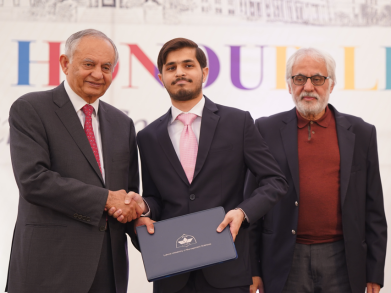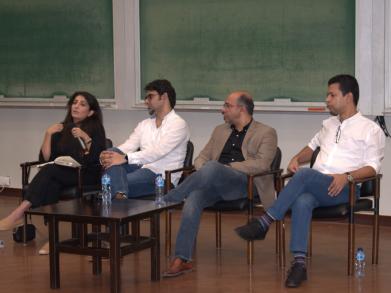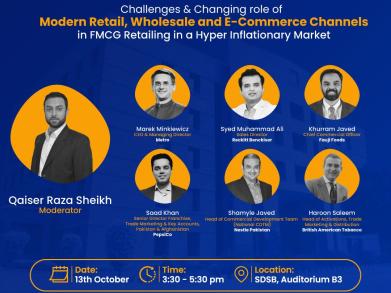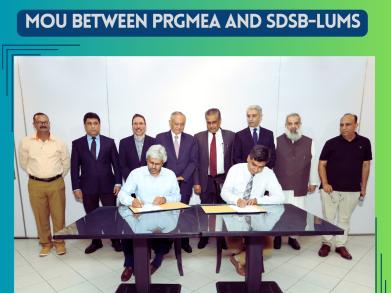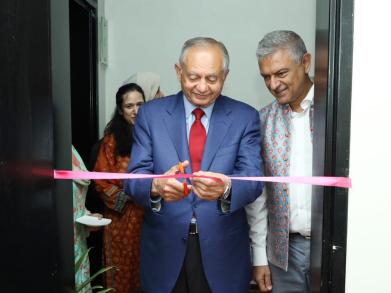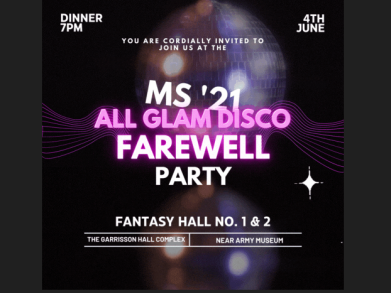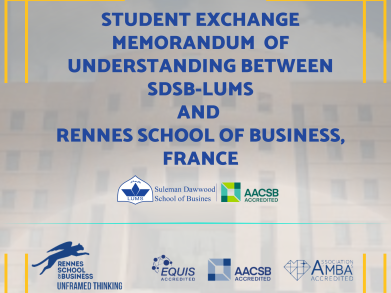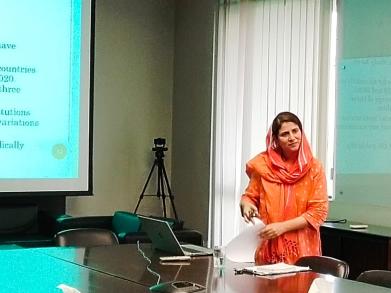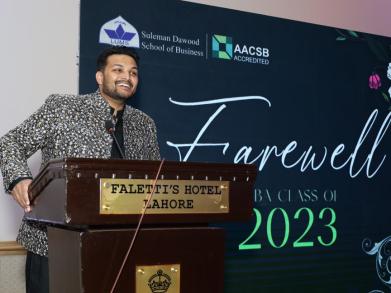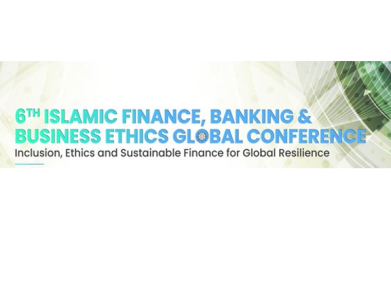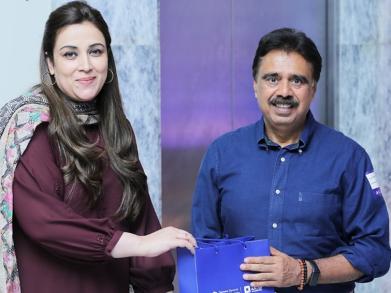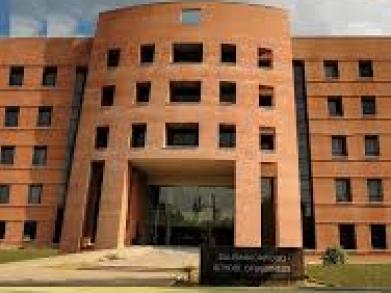In Conversation with Dr. Muhammad Tariq, Recipient of Vice Chancellor’s Award for Teaching Excellence
Dr. Muhammad Tariq, Associate Professor in Cell and Molecular Biology at the Syed Babar Ali School of Science and Engineering (SBASSE), is one of the five awardees of the inaugural Vice Chancellor’s Awards for Teaching Excellence. The Award celebrates exceptional and inspirational teachers at LUMS.
Dr. Tariq is considered a master storyteller by his students and colleagues in Biology. His philosophy of ‘no question is a stupid question’ has gone a long way in shaping critical thinkers and motivating his students. He captivates students and takes them on a journey that delves into theoretical concepts in ways that keeps them interested and excited to learn. His teaching strategies prompt students to think independently, question the existing views in his field and define new questions of scientific inquiry.
His students attest to his passion for teaching and the contagious energy and enthusiasm that he brings to the classroom. In the words of one student, “teachers don’t just teach you a subject, they teach you a way of looking at it, and they teach you about yourself. I have come away having learned a lot about human biology…” He is an example of a motivated teacher, always willing to learn from his experiences. In his own words, “the word ‘evolution’ best describes my growth as a teacher during the last twelve years at LUMS…It all started from knowing nothing about how to be an effective teacher…” He surely has evolved to be an outstanding student-centred teacher at LUMS.
We sat down with Dr. Tariq to learn more about his students, how they inspire him, and his future goals.
Are there any teachers in your life who inspired you?
When I was a student, I was extremely fortunate that I had some of the finest teachers at different times in my life. For example, Dr. Jawad Khan taught me intermediate Biology and I learnt Chemistry from Rana Rasheed. When I moved to Agriculture University in Faisalabad, Dr. Ibrahim (late), Dr. Muhammad Arshad (late) and Dr. Waqar Ahmed played a pivotal role in my growth as an independent thinker. During my MPhil at NIBGE, I was lucky to learn Molecular Biology from Dr. Waris Shah who inspired me to work in the field of gene regulation.
What inspired you to become a teacher?
I always felt we have very few teachers in Pakistan who can teach strong fundamentals and inspire students. I knew that I lacked the strong fundamentals required to become a good scientist. The real turning point came in 1999 when I joined Prof. Jerzy Paszkowksi’s lab as a PhD student at FMI, Switzerland and his mentorship taught me how to inspire students and what it takes to be a scientist. After Prof. Paszkowki, my training in Prof. Renato Paro’s lab at Centre for Molecular Biology Heidelberg (ZMBH) and ETH Zurich introduced me to teaching undergraduate and graduate students.
It was during my PhD and postdoc in Switzerland and Germany, respectively, that I realised why our education system fails to inspire students. During my decade long stay in Europe, I became fully convinced that we should develop basic research and only these researchers should go to classrooms to teach and that is the only way we will be able to produce the next generation of problem solvers and innovative minds in our society. I always dreamed of having more world-class researchers and teachers in Pakistan so that our students get the best learning opportunity, and our future generations learn from the best teachers.
Since I had experienced some of the world’s best learning environments, I wanted to pay back my country by developing a culture of basic research and teaching fundamentals in Pakistan. I always knew that our students are hardworking and resilient. Despite all odds, they can do wonders if given an opportunity. I did not want our future generations to suffer. That was the spirit that led me to come back and get into teaching and try to develop a culture of fundamental research in life sciences in Pakistan. Trust me, our students are second to none in the world, and they are the ones who attracted me back to Pakistan.
What are some of the challenges teachers face today?
Our society has delineated research from teaching and that is the crux of our problems in higher education. However, I believe that if you are a good researcher, you are an excellent teacher. This is because you will bring that practical experience to the classroom and you will be able to create excitement in the class by talking about questions at the cutting-edge, and have conversations about real-life challenges. Without this, our teaching will be shallow and that is what is at the heart of the problem when I talk about deficiencies in the basics of graduates.
What is common in all the winners of this Award is that we all actively engage in research in our domains. While we are giving our best as teachers, funding for research in Pakistan has shrunk to levels that we feel suffocated, struggling for simple bread and butter to run our labs. For me, teaching and research are two sides of the same coin and our country should ensure this coin shines. At the moment, it is rusty and that’s the cause of many problems we all face in our society. That’s why I believe that such Awards initiated by LUMS are an excellent initiative and will go a long way in our rejuvenating our education sector.
How do students influence your teaching style?
My best judge and legacy are my students. A teacher-student relation is not limited to just teaching a textbook, or providing mentorship in a lab; I have to act as a role model inside and outside the classroom so that I give this world the best humans. I have to be available to my students anytime when they need me. A good teacher is one whose students go to the heights he dreamed for himself and his students become his recognition; just like Rumi for Shams.
I have frank conversations with my students and take their feedback very seriously. My first lecture at SBASSE was in 2009 when I taught genetics to sophomores. I had just come from Switzerland and had never taught undergraduates. In my passion for teaching, I taught them a Master’s level course! That batch of BS Biology 2012 was extraordinary. Although they did exceptionally well in that rigorous course, they gave me a lot of feedback and pointed out many areas where I could improve. Even today, I utilise the feedback that the first batch gave me in my classes.
Every student is special in a class. I try to bring an average student to excellence and the ones that are below average to an above-average level. What I love most about LUMS students is that they are passionate, hardworking and thirsty for knowledge. They value the learning experience and good teaching.
My dream as a teacher is that I should inspire my students and not just ‘teach’ them. I want to inspire them to ask questions, look at things critically and analyse things. In particular, I allow them to fail and make mistakes when they join me in my epigenetics lab for senior projects and thesis research. I want them to learn from failed experiments to become independent learners. I believe that if you give this world one truly good human who is your student, then as a teacher, you have done your job.
What value does the Vice Chancellor’s Award for Teaching Excellence hold for you?
I feel so humbled and honoured. I may be the one being awarded and recognised, but behind me are my students, my teaching assistants and people who have been a part of my epigenetics lab. The Award relies on feedback from students and faculty about how we have been able to create a difference for our students. Teachers may be the front face of this Award, but we are celebrating the experience of our students and how we have been able to transform their lives.
Why are initiatives such as the Vice Chancellor’s Award for Teaching Excellence so important? What impact are they likely to have on the teaching profession?
Our society does not value the role of teachers and mentors. We don’t realise the significance of good teachers in our lives and how they can transform our country, so we take teaching for granted. Through this initiative, LUMS has sown the seeds of celebrating teaching and glorifying the role played by teachers who aim to leave an impact on the lives of their students. These awards are about honouring, celebrating and remembering teachers who can inspire students to dream big and look beyond their horizons.
I am sure this initiative will ignite a chain reaction, and in the long run, I am positive that we will see an impact on how our society values teachers and classroom learning.
How do you envision improving teaching and learning in the country?
I believe it is time that LUMS should develop faculty development and mentorship programmes for our colleagues in sister institutes in Pakistan. We at LUMS, have huge wealth available in the form of experienced faculty and a large number of courses across five different schools. We should encourage our faculty to develop at least one online course in their area of expertise which can be made freely available to students and their teachers beyond LUMS.
I am seriously thinking about developing an online course in my domain, together with the LUMS Learning Institute, that could be accessible for the wider community. We should take the opportunity to develop such courses and place them on YouTube. Some of our colleagues have already done so, like Dr. Sabieh Anwar with his Physics lectures that are watched by people from around the world. I am quite certain his lectures have silently taught many beyond the walls of LUMS, and even beyond Pakistan, on how to teach and learn complex topics of Physics.
We have real gems at LUMS who are excellent teachers, and the University should encourage and support the development of such initiatives together with the Syed Ahsan Ali and Syed Maratib Ali School of Education and the LUMS Learning Institute. Let’s bring these courses, instruments and tools to the doorsteps of students and teachers who could not get access to LUMS. It will create an immensely positive impact on society.

